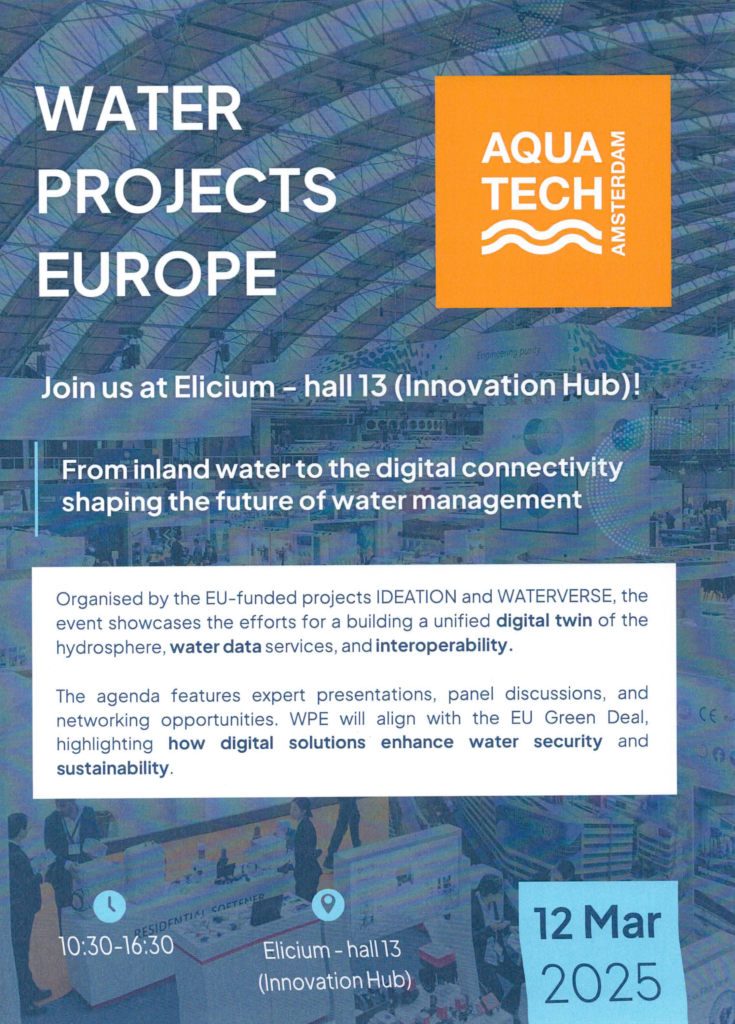SEDIMARK knows the importance of regulating data management issues within a context such as the one posed by the project. A solution will be considered where consortium partners will deposit all underlying information on data-related business processes (data storage, data provisioning, processing etc.) of the SEDIMARK solution clearly and transparently.
The purpose of the Data Management Action Plan (DMAP) is to identify the main data management elements that apply to the SEDIMARK project and the consortium. This document is the first version of the DMAP and will be reviewed as soon as there is a clearer understanding of the types of data that will be collected.
Given the wide range of sources from which data will be collected or become available within the project, this document outlines that the consortium partners will consider embracing and applying the Guidelines on FAIR Data Management in Horizon 2020 and Horizon Europe (HE); “In general terms your data should be ‘FAIR’, that is Findable, Accessible, Interoperable and Re-usable” [1], as information about data to be collected becomes clearer”.
Open access is defined as the practice of providing on-line access to scientific information that is free of charge to the reader and that is reusable. In the context of research and innovation, scientific information can refer to peer-reviewed scientific research articles or research data.
The SEDIMARK consortium strongly believes in the concept of open science, and in the benefits that the European innovation ecosystem and economy can draw from allowing the reuse of data at a larger scale.
Hence, as described in this report, the consortium will deposit the public data produced within or collected for the purposes of the project in an open data repository once the exploitation rights are safeguarded. It will permit the user to access, mine, exploit, reproduce and disseminate free of charge. Furthermore, it will provide information as well about tools and instruments necessary for the project results whenever possible.
As Data Security and Data Privacy are of particular concern, SEDIMARK will consider the GDPR (General Data Protection Regulation) privacy principles from conception to design to build a novel privacy-preserving architecture.
Moreover, this report addresses the ethics issues detected in SEDIMARK with the aim of:
All in all, this report represents a second snapshot taken mid-way through the execution of the project (already in its eighteenth month of activity). The final update on the data management plan will be reported after at M36, September 2025, as part of a dedicated section for data management plan updates.
Due to the nature of this report, iterative and offering annual updates, the new content provided in this iteration will be written in a dark blue colour, sticking to the project's stylistic guidelines.
The D1.3 deliverable can be downloaded from here.
Data quality is of the highest importance for companies to improve their decision-making systems and the efficiency of their products. In this current data-driven era, it is important to understand the effect that “dirty” or low-quality data can have on a business. Manual data cleaning is the common way to process data, accounting for more than 50% of the time of knowledge workers. SEDIMARK acknowledges the importance of data quality for both sharing and using data to extract knowledge and information for decision-making processes. Thus, one of the main goals of SEDIMARK is to develop a data processing pipeline that assesses and improves the quality of data generated and shared by the SEDIMARK data providers.
This deliverable presents the final version of the methods and techniques developed within SEDIMARK for processing data and improving their quality, extending the first version which was delivered in SEDIMARK Deliverable D3.1 [74]. The focus in this deliverable is to present the final version of the key techniques that are used for quality improvement of datasets, based on the requirements of the SEDIMARK platform so that they all work together smoothly.
SEDIMARK considers two main types of data generated and shared within the marketplace: (i) static/offline datasets and (ii) dynamic/streaming datasets. The project acknowledges that it is important to cater to both types of datasets equally, thus in most scenarios, separate and customised versions of the tools have been developed for static and streaming datasets. Techniques for outlier detection, noise removal, deduplication and imputation of missing values are important for improving the quality of datasets. These techniques aim to remove abnormal values or noise from the dataset, remove duplicate values or fill out gaps in some entries or add complete entries. Techniques for feature engineering such as feature extraction and selection have also been developed to enrich the datasets. Synthetic dataset creation is important in scenarios where data providers don’t want to share their real datasets (i.e. for privacy reasons) but want to share synthetic versions that mimic the real ones.
This deliverable also presents the framework to orchestrate the whole functionality of the data processing pipeline using a Data Processing Orchestration. This component enables end users to interact with the built-in data processing solutions through a simplified dashboard interface. This deliverable also presents the final version of the key quality metrics that SEDIMARK has defined for assessing the quality of datasets, both per data point and as a whole, as well as the key techniques for dataset quality improvement, designed to meet SEDIMARK platform requirements and ensure seamless integration.
Another important part is the description of techniques towards reducing the energy consumption of the components of the data processing pipeline and optimizing data efficiency, i.e. using techniques for data distillation, coreset selection and dimension reduction. Minimising the communication cost in distributed machine learning scenarios is also important for SEDIMARK, because communication can increase energy consumption. Techniques to optimise the Artificial Intelligence (AI) models both during training and inference are also presented, focusing on quantisation, pruning, low rank factorisation and knowledge distillation.
Finally, considering that minimising energy
consumption can influence performance or communication, the deliverable presents the final analysis on these trade-offs, aiming to provide insights to data providers on how to better configure the pipeline or what models they should select in order to achieve their targets (energy efficiency/performance/communication).
D3.2 deliverable can be downloaded from here.
The SEDIMARK project will be featured at Open Source Community Day 2025! Join us in Madrid on 23–24 September for this two-day event focused on boosting open source innovation through collaboration and community.
Tarek Elsaleh, representing SEDIMARK, will be one of the confirmed speakers — bringing insights into how EU-funded open source solutions are shaping the future of data sharing and innovation in Europe.
Co-organised by the Eclipse Foundation and the CEI-Sphere project, and co-located with the #AIOTI Days, this event gathers #developers, #researchers, #industry leaders, and #policymakers to explore open source’s role in driving impact across sectors.
Highlights include:
✅ Keynotes, expert panels, and roll-up exhibitions from major EU initiatives
✅ A dissemination session for sharing tools, results, and collaborations
✅ A speaker lineup featuring:
📍 Colegio Oficial de Aparejadores y Arquitectos Técnicos de Madrid
🎟️ Early bird tickets: just 70 EUR – includes lunch, cocktail & more!
👉 Register here
On June 25th and 26th, the SEDIMARK consortium gathered in Dublin, Ireland, for a new General Assembly meeting hosted by University College Dublin (UCD). The city’s vibrant atmosphere, combined with the university’s inspiring academic setting, offered the perfect environment for two intensive days of discussions, planning, and collaboration.
The meeting focused primarily on the integration of the project’s core components and, in particular, on advancing the two central development streams: Minimum Viable Intelligence (MVI) and Minimum Viable Marketplace (MVM). These technical sessions sparked valuable exchanges among partners, helping to align priorities and coordinate efforts across the different teams working on backend, frontend, and data pipelines.
Beyond the technical aspects, the consortium also devoted time to prepare for the upcoming Hackathon that will take place this September. The Hackathon is set to become a key milestone for the project, serving both to demonstrate the capabilities of the SEDIMARK platform and to engage external developers and stakeholders who can bring fresh ideas and feedback.
Overall, the Dublin meeting was highly productive, resulting in concrete action points and a clear roadmap for the remaining months of the project. As we move towards the final stages, the collaboration and shared vision among partners continue to drive the project forward. Stay tuned for updates on our next activities, and of course, on the Hackathon!
At the heart of #SEDIMARK lies a powerful AI architecture, featuring MageAI and MLFlow, designed to revolutionize energy optimization. MageAI orchestrates seamless AI workflows, while MLFlow automates robust machine learning pipelines, enabling accurate and localized energy consumption predictions. Our integrated system supports dynamic customer management strategies, ensuring a transparent, scalable, and efficient solution for energy forecasting.
We leverage capabilities like federated learning, real-time inference, and secure data exchange to enhance the reliability and usability of our system. This AI-driven approach empowers users to make data-driven decisions, fostering a sustainable energy future. Through advanced analytics and actionable insights, we are transforming energy distribution and enhancing customer experiences.
We are poised to optimize energy management for the future, making waves in energy efficiency. Learn how #SEDIMARK is leading the charge in #AIforEnergy, #DataDriven, and #EnergyInnovation. #METLEN #AI #Sustainability #Innovation #EnergyEfficiency
WINGS hosted a new face-to-face General Assembly meeting of the SEDIMARK project on March 19th and 20th in Athens, Greece. The mediterranean sea, a long and rich culture, excellent food, and wonderful people are always a winning formula.
The whole consortium participated in the meeting, in which technical aspects regarding all of the active Work Packages were thoroughly discussed. Particularly, the bulk of the discussions were focused around the three streams that are at the core of the implementation phase of the project: Minimum Viable Marketplace (MVM), Minimum Viable Intelligence (MVI), and Backend-Frontend integration (MVM-MVI). Moreover, the project's Use Cases are reaching the final stage of integration and deployment, and will very soon serve as crucial data providers and consumers for the validation of the SEDIMARK marketplace.
And as the cherry on top, preparations for the upcoming Hackathon, to be hosted this summer, are also underway. Stay tuned so you don't miss it!
On March 12th, Luis Sánchez, Technical Coordinator of the SEDIMARK project, had the privilege of presenting at the Water Projects Europe Workshop on From Inland Water to Digital Connectivity: Shaping the Future of Water Management. The presentation was part of the session on Understanding Digital Water Management and Interoperability, focused on the SEDIMARK Project and its innovative approach that could fit into the needs and challenges of transforming water management through digital technologies.
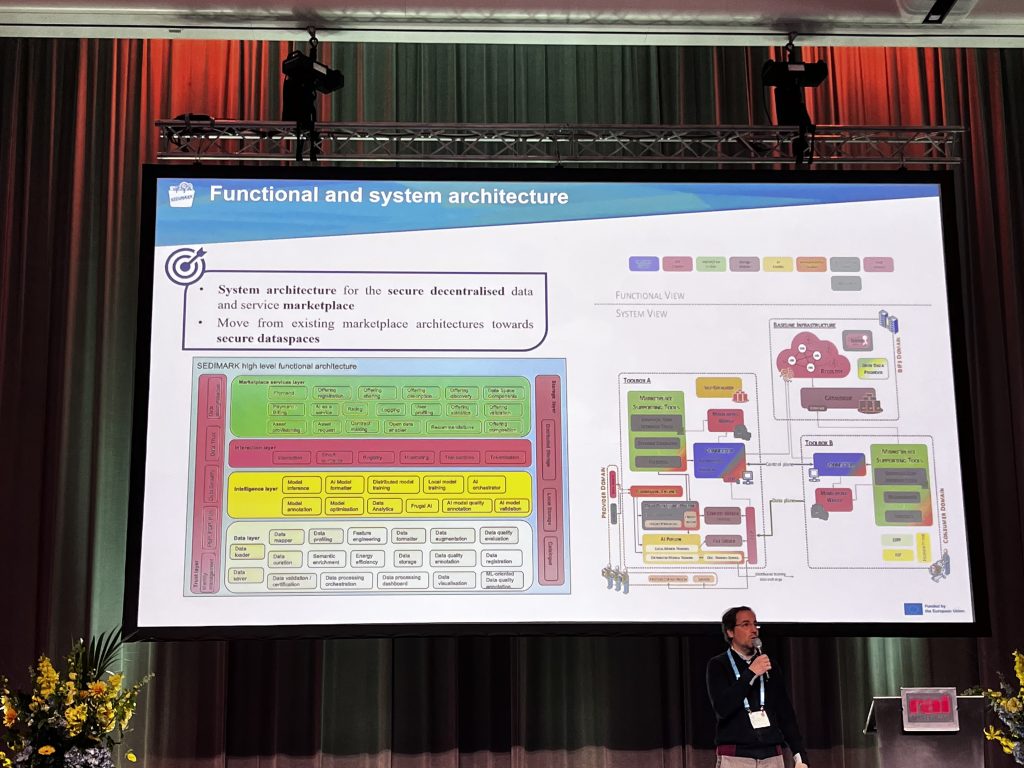
The SEDIMARK Project is developing a Distributed, Intelligent and Trustworthy Data Marketplace based on the Data Spaces paradigm. This platform enables seamless data sharing between stakeholders, such as governments, utilities, and researchers, by focusing on data interoperability, quality, and trustworthiness. By ensuring that data is accurate, transparent, and secure, SEDIMARK empowers informed decision-making, improving water resource management and fostering collaboration across sectors.
The SEDIMARK Project is pioneering the development of a Distributed and Intelligent Data Marketplace, a cutting-edge platform aimed at facilitating the seamless exchange of water-related data across various stakeholders, including governments, water utilities, researchers, and private companies. At the heart of SEDIMARK lies the Data Spaces paradigm—a new approach that enables data to be shared and exchanged across a range of sectors and industries while ensuring data privacy and security.
A primary goal of the project is to enhance data interoperability—ensuring that data from various sources can work together seamlessly to support decision-making. By leveraging data interoperability, SEDIMARK enables the integration of disparate datasets such as environmental data, water consumption data, and climate-related data, empowering stakeholders to make informed decisions based on a complete picture of water systems.
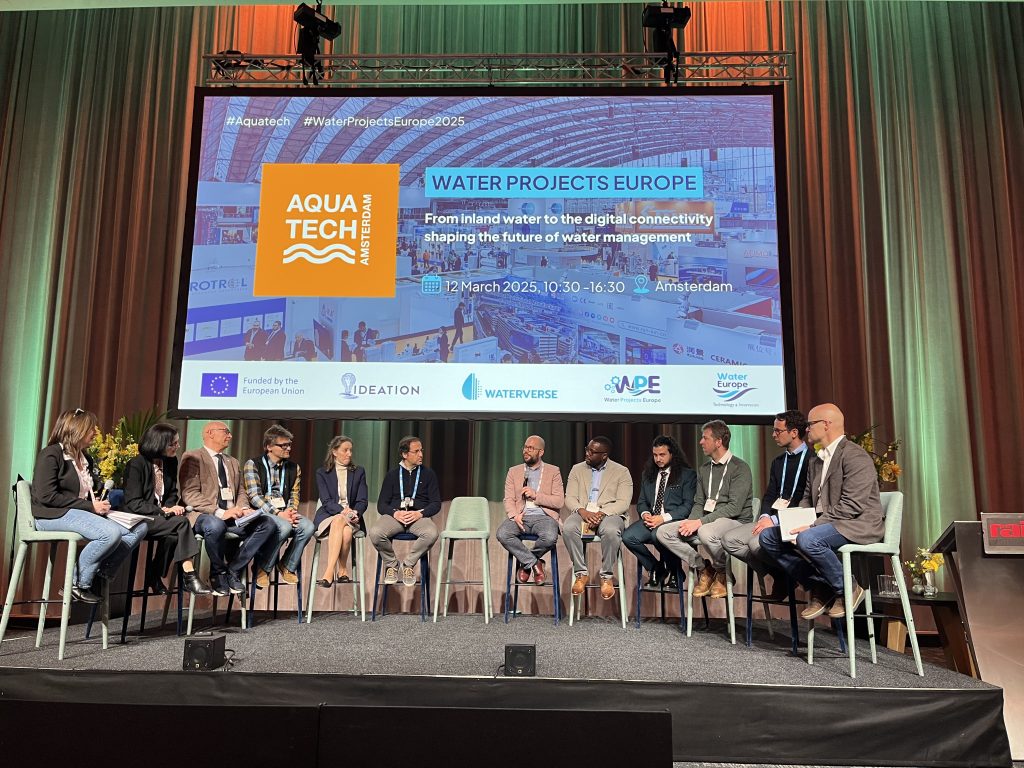
But, as we all know, data is only valuable if it’s trustworthy. That’s why the SEDIMARK Project places a significant focus on data quality and trustworthiness. Trust is a key enabler for the success of digital water management systems, and ensuring data quality, provenance, and transparency is essential to building that trust. The project employs mechanisms that ensure that data shared within the marketplace is accurate, verifiable, and useful for the end-users. One of the most exciting aspects of the SEDIMARK platform is its ability to support data exchange scenarios. Whether it's about sharing water quality data from rivers, monitoring urban water usage, or assessing the impact of climate change on freshwater availability, SEDIMARK offers a mechanism for exchanging this critical data across borders and sectors, thereby enabling better decision-making and more efficient water management practices.
Following the presentation, a dynamic closing round-table with other experts in the field of digital water management was organized. The significant barriers and challenges that organizations and stakeholders face when trying to implement digital and smart water management solutions were explored.
One of the major challenges that were discussed was the lack of standardized data formats and protocols, which often hinders data interoperability. Despite advancements in technology, different water management systems often use incompatible data formats, making it difficult for stakeholders to share and use the data effectively. Standardizing data formats and establishing common protocols for data exchange could go a long way in overcoming this issue.
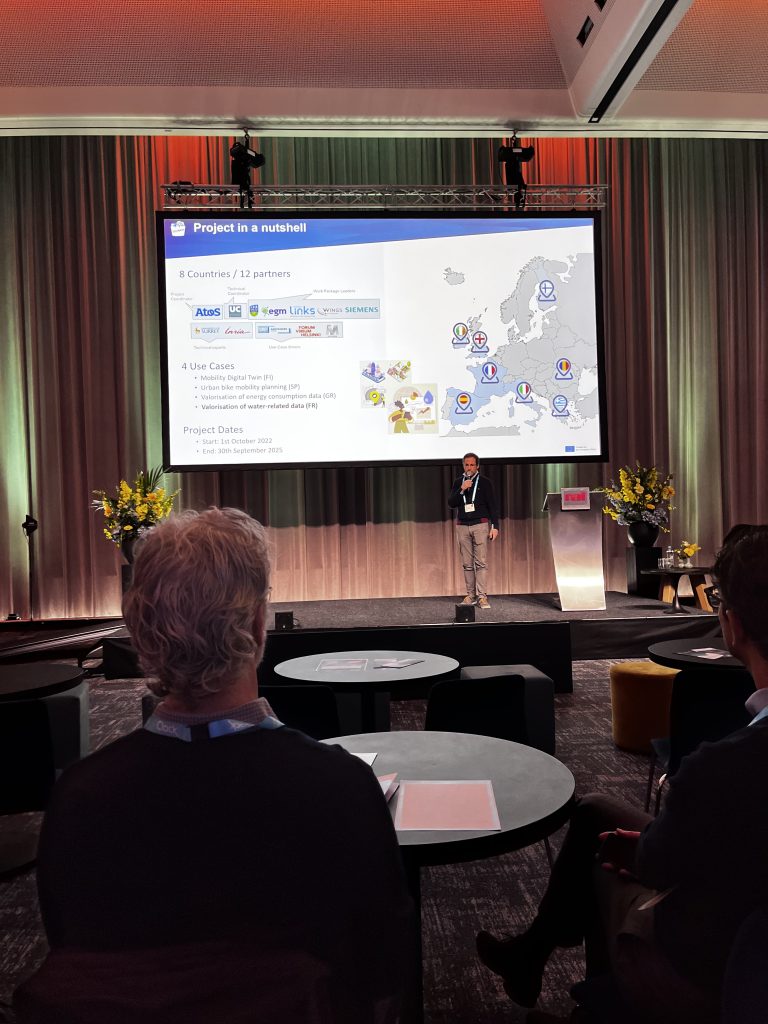
Another challenge raised was the resistance to adopting new technologies. Many organizations, especially in more traditional sectors like water management, are hesitant to embrace digital transformation due to concerns about cost, complexity, and the learning curve associated with new systems. Overcoming this resistance requires demonstrating the tangible benefits of digital water management solutions, such as improved resource efficiency, cost savings, and better environmental outcomes.
Lastly, the issue of data privacy and security was discussed. As water management systems become more interconnected, the amount of data being exchanged increases exponentially. This raises concerns about the protection of sensitive data, such as personal information or proprietary business data. Ensuring robust security protocols and establishing clear guidelines around data ownership and access are critical for fostering trust among stakeholders.
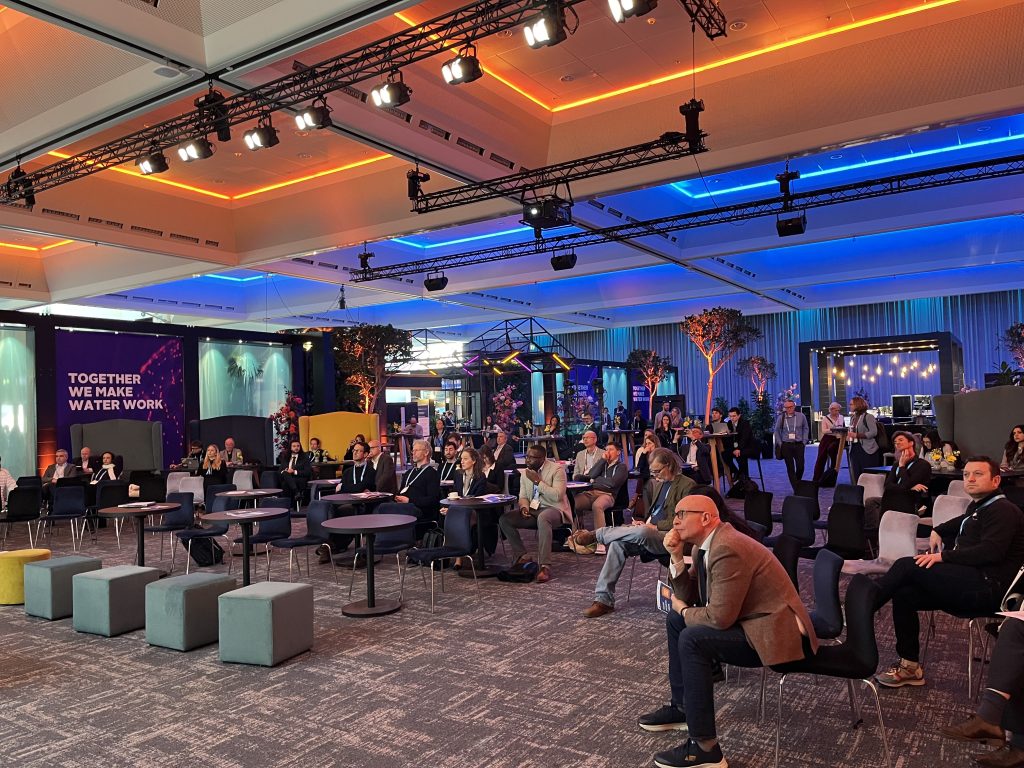
In conclusion, the workshop provided a valuable opportunity to discuss how digital connectivity is shaping the future of water management. The SEDIMARK Project and similar initiatives are laying the groundwork for a more interconnected, efficient, and sustainable approach to managing water resources. However, the road to fully digitalized water management systems is not without its challenges. Overcoming barriers like data interoperability, technology adoption, and data security will require collaborative efforts from governments, industry leaders, and technology developers.
Quoting our Technical Coordinator: “As I left the workshop, I felt optimistic about the progress being made in digital water management and excited about the role that the technological enablers that projects like SEDIMARK are developing will play in the future of sustainable water use and management.”
